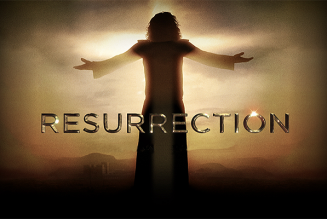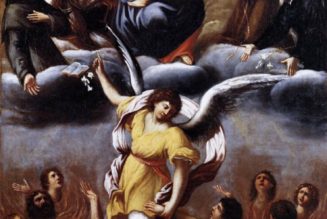
Peter asks a great question, but a question which is, nonetheless, ego-driven on the 24th Sunday in ordinary Time, Year A.
He wants to know how often to forgive, and even guesses a number. Jesus gives him a number 1,000 percent higher and tells him a story that demonstrates just how selfish Peter’s original question was.
It’s also a story that points to a solution that I’ve found transformative.
First of all, this Gospel is a necessary follow-up to last week’s.
In last week’s Gospel, Jesus instructed his disciples on how to correct people. This week we get the necessary corollary of correction: forgiveness.
“Lord, if my brother sins against me, how often must I forgive?” Peter asks, and ventures a generous answer. “As many as seven times?”
What he’s really asking is, “How many times do I have to take people’s disrespect before I can put them in their place?” Jesus answers, “I say to you, not seven times but seventy-seven times,” which essentially means, “indefinitely; endlessly.”
In other words, forgive the way you keep expecting everyone else to forgive you.
We get forgiven over and over again by people in life. Our friends look the other way at our faults so often that we don’t even realize they’re doing it. They tolerate the ways we overstep,and judge and misspeak, again and again. Our parents do, too — our mother forgave how drastically we disrupted her life as a baby, how we bumbled through life needing her constant attention as a child, and how often we ignored her or gave her the cold shoulder once we grew up.
They forgave all these things because their ego disappeared behind the love they have for us. But our ego takes center stage when we look at others.
We want people at work to overlook our mistakes and we bristle when they point them out; we want people at home to forgive our faults instead of harping on us constantly. This comes from our expectation that we are the center of the world, and it has the further consequence of causing us to burn with rage at others’ mistakes at home, at work, and on the road between the two.
Jesus’s message today is that, no, you’re not the center of the world. He is.
That is the meaning of the story Jesus tells, the Parable of the Unforgiving Servant.
The debtor in the parable owes the king “a huge amount” — which most translations specify as 10,000 talents, or 20 years’ wages. Think of that. He owes a generation worth of his family’s livelihood — the substance of his life, along with those of his wife, children and property. And when he can’t pay it back, he stands to lose his entire family’s life: “to be sold, along with his wife, his children, and all his property, in payment of the debt.”
It’s clear what this debt stands for: His whole world, everything he holds dear. But his master magnanimously forgives the debt.
Then, the forgiven servant meets a man who owes him 100 days wages — a truly significant debt, representing a third of the year’s earnings — and he grabs him and chokes him and refuses to forgive him. His fellow servants are “deeply disturbed” and report him to the king, who “handed him over to the torturers.”
Jesus provides a chilling moral of the story: “So will my heavenly Father do to you, unless each of you forgives your brother from the heart.”
Why? Think of the implications of the parable. How is it possible that this deeply indebted man could make a huge loan to a fellow servant? Since he had no money of his own, it must have been his master’s money he loaned. So not only was he being unforgiving, he was demanding money that wasn’t his, but part of the debt his master had already forgiven.
We are exactly like the servant in the story. Not only do we fail to forgive — we forget that the debt we are exacting from our neighbor is not ours to police in the first place.
That’s why, living this Gospel requires an extra step before we forgive.
Sinners don’t sin against you or me, they sin against God. When they do harm you or me, it is part of a cycle of harm that we all share in, and when we forgive them, more than being personally magnanimous, we are simply extending God’s magnanimity.
I use two prayer practices to try to make these aspirations real in my own life. One is designed to remind me how God’s mercy pours out blessings every day; the other helps me forgive people in my life — extensively, regularly.
First, I thank God daily by going through a catalogue of his enormous blessings and finding where they applied in the last 24 hours. It’s a way to short-circuit my ego and create a deep awareness that even on the worst days and even in the most terrible crises, God’s gifts are greater than my crosses. I think this is definitionally true: The gift of life — a life filled with beauty, truth and goodness — trumps all crosses because to be alive is such a great good; and the gift of faith — and with it, eternal life in God — trumps all disappointments.
The idea is to remember that every day for us is the day the master forgave the debt in this story. We owe so much and instead we get showered with graces because “The Lord is kind and merciful, slow to anger and rich in compassion,” as the Psalm puts it.
Our own forgiveness flows from that.
But our forgiveness has to be real, and thorough, like God’s.
I have a second practice for that. In addition to a daily catalogue of blessings, I regularly review categories of people to forgive. These Forgiveness Prayers, revised from a book on forgiveness, are an opportunity to forgive at least 77 times, every time I pray them.
The prayers go places I never would have gone, including “forgiving” God by confronting our bitterness toward him, forgiving ourselves for the many mistakes we can’t forget, and forgiving the Church for neglecting the sacraments so disastrously in so many lives.
These prayers also bring about painful realizations: Those closest to us — our mothers and fathers especially, but other relatives as well — are the people who have helped us most and hurt us the most, too, in ways the Forgiveness Prayers specify with painful realism. The most surprising experience for me is noticing all the service people I have to forgive — the greed, shoddy work, neglect and fraud of realtors, mechanics, construction companies, etc. — and the sins of friends and ex-friends whose betrayals still stagnate in my heart.
The Forgiveness Prayers end with this excellent summing up of forgiveness:
“Forgiveness is an act of the will, not a feeling. If we pray for a person, we can be assured that we have forgiven that person. To help accept an individual and open ourselves to a particular person more, picture that person with the Lord Jesus and say to the Lord, ‘I love him because You love him. I forgive him because You forgive him.’”
That gets at the core message of Jesus’s ego-destroying words in Sunday’s Gospel.
The readings spell it out. The First Reading, from Sirach, asks: “Could anyone refuse mercy to another like himself? Can he seek pardon for his own sins?” The Psalm describes God’s own forgiveness: “As far as east is from the west, so far has he put our transgressions from us.” And St. Paul in the Second Reading gives the greatest reason: “For this is why Christ died and came to life, that he might be Lord of both the dead and the living.”
As a result, says Paul, “Whether we live or die, we are the Lord’s.” Nothing we have is ours; it’s all his. Even the transgressions we suffer are his: Jesus Christ claimed them.
In the story about the unforgiving servant, “his master handed him over to the torturers until he should pay back the whole debt.” In our case, we don’t have to go to debtor’s prison and neither do those who sin against us, because Jesus handed himself over to the torturers in our place.
And now Jesus acts first, forgiving us not 7 times, or 77 times, but over and over and over again, daily, weekly, monthly — our venial sins at each Mass and our serious sins at each confession.
To live in that grace is to live in a constant state of such overwhelming gratitude that his forgiveness becomes our own.
Photo: Wikimedia commons.








